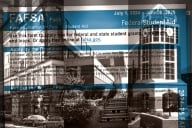You have /5 articles left.
Sign up for a free account or log in.

Education Secretary Betsy DeVos, testifying to a Senate committee last year
Getty Images
Democrats in the U.S. House of Representatives were able to pass a measure last week expressing opposition to Education Secretary Betsy DeVos’s borrower-defense rule. But because of politics and both ongoing and upcoming legal battles, the vote did little to clear up what will happen to students who are asking for their loans to be discharged because they were defrauded by colleges.
Hardly clear are two questions: how to deal with the backlog of more than 200,000 borrowers, most of whom attended for-profit institutions, who’ve been waiting for the Education Department to process their requests for debt forgiveness.
Also uncertain is how cases will be handled in the future. A new rule proposed by DeVos that would make it harder for borrowers to get relief is set to go into effect in July, but it will likely be challenged in the courts before then.
In terms of dealing with the current backlog, DeVos in December raised the concerns of advocacy groups by announcing that the department will begin excusing only a portion of the debt owed by students, even after they’ve been determined to have been defrauded. The move would be a departure from the Obama administration, which sought full relief for defrauded students.
To advocates, DeVos’s new attempt would mean many borrowers would only get a portion of the relief they would have been entitled to under the Obama administration, said Abby Shafroth, a staff attorney at the National Consumer Law Center, and Beth Stein, senior adviser at the Institute of College Access & Success.
Eileen Connor, legal director of Harvard Law School’s Project on Predatory Student Lending, told The New York Times when the new proposal was announced that it would file a legal challenge.
Meanwhile, a previous attempt by the Trump administration, in December 2017, to begin giving only partial relief was temporarily blocked in 2019 by a federal court, which ruled that the borrowers' privacy rights were violated because the department used their federal earnings data from the Social Security Administration.
That case is still continuing, however. The department has appealed the injunction against the first partial-relief plan to the Ninth Circuit Court of Appeals in California, which could conceivably approve the first partial-relief plan.
Should the courts end up blocking both the first and second partial-relief plans, the amount of relief will depend on what standard was in place when a borrower took out the loan.
In ordering the injunction, Federal Magistrate Judge Sallie Kim barred the Education Department from trying to collect from some Corinthian Colleges graduates. But last October, Kim held DeVos in contempt of court for continuing to collect from the students after the Education Department acknowledged in a court filing that it had improperly sought to collect on loans from more than 16,000 students. More than 1,800 of those students were subject to involuntary collections like wage garnishment or seizure of tax refunds.
Beyond the question of whether the department can give only partial relief to defrauded students, also unresolved is how difficult it will be for thousands of other borrowers who are expected to file for relief in the future.
Currently, applications are judged under standards set up by the Obama administration. But DeVos and some Republican lawmakers complained those standards are too lenient and balk at estimates they’d cost $42 billion over the next decade.
So DeVos in August announced her own rule, which describes how to handle claims for loans made after July 1.
“The rule corrects the overreach of the prior administration, gives students and borrowers the relief that they’re owed, and restores fairness and due process, saving taxpayers $11.1 billion over 10 years,” a department spokeswoman said in a statement last week.
But critics say DeVos went too far and made it too difficult for defrauded students to get relief.
Whether Congress takes action is anyone’s guess.
Last week, the House, 231 to 180, voted to block the rule, sending the measure to the Senate.
“Even in cases where the schools clearly violated the law, the burden of proof on the defrauded student is so absurdly unrealistic, it would take a team of lawyers for the student to have a shot at proving intent and misconduct from the school,” Representative Susie Lee, a Nevada Democrat, said in arguing last Thursday for the resolution she sponsored opposing the new standards.
Six House Republicans joined Democrats in passing the measure, which gave advocates some hope of getting it through the Republican Senate.
But even if does pass, the measure is expected to be vetoed by President Trump.
Congress could then still decide to block the new rule as part of a broader Higher Education Act reauthorization, which would deal with a range of issues from increasing Pell Grant spending to further simplify student loan applications.
A version by Democrats that was approved by the House education committee in October would block DeVos’s tougher system and, instead, strengthen the method used by the Obama administration by setting clearer timelines for handling claims.
However, the Republican majority in the Senate would have to agree to include it in a reauthorization bill. With differences over a number of other issues, it’s unclear if the House and Senate will even be able to agree on a reauthorization for the foreseeable future, Stein said.
If Congress doesn’t take action, DeVos’s tougher standards would stay in place.
Yet DeVos’s tighter standards also are expected to face a legal challenge, meaning those standards, too, could be headed to the courts.







